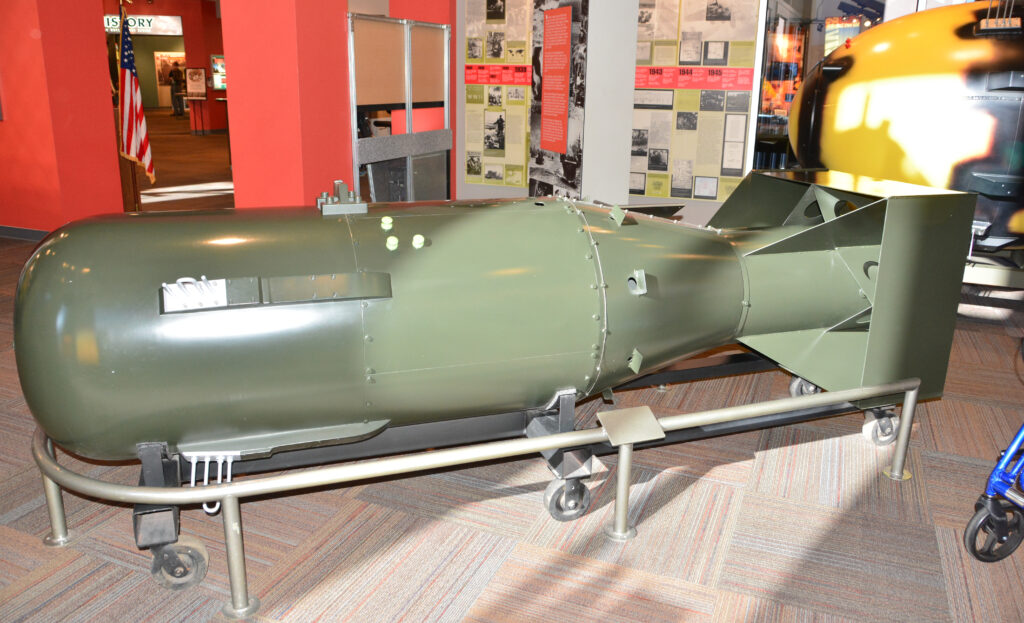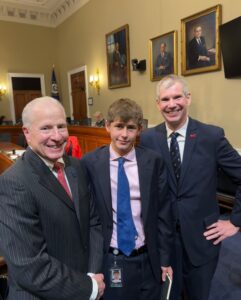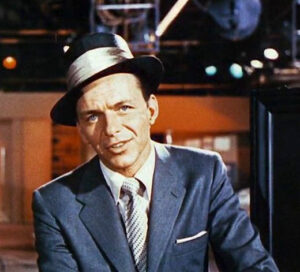Bulletin #207 — Aug 2025
VJ Day + 80

Replica of Hiroshima bomb; Image: Wikimedia Commons
August 6, 2025
How Churchill Responded to Use of the Atomic Bomb
By KEVIN RUANE
On 6 August 1945, a United States B-29 bomber dropped an atomic bomb on the Japanese city of Hiroshima. Three days later the United States deployed a second A-bomb against Nagasaki. Less than a week later, on 14 August, Japan surrendered. The Second World War was over. How did Winston Churchill respond?
As Prime Minister, Churchill knew better than most that the atomic bomb was no ordinary weapon. He recognized that it represented a harnessing of “the secrets of nature, long mercifully withheld from man,” for the purposes of warfare. Inevitably, the super-weapon produced super-casualties. Taking Hiroshima and Nagasaki together, over one hundred thousand people died instantly, a figure that would nearly double by the end of the year as radiation took its toll of initial survivors. For Churchill, however, the end—Japan’s capitulation without the need for a costly Allied invasion—justified the means.
Two days after Tokyo’s surrender, Churchill, by then Leader of the Opposition, made a number of weighty assertions about the A-bomb in the House of Commons:

2025 International Churchill Conference
First, “it is to this atomic bomb more than to any other factor that we may ascribe the sudden and speedy ending of the war against Japan.”
Second, the A-bombs saved “a million American and a quarter of a million British lives,” which would have perished had the planned Allied invasion gone ahead in the autumn.
Third, “the decision to use the atomic bomb was taken by President Truman and myself at Potsdam.”
Lastly, the A-bomb was not a cause for moral or ethical agonising because “had the Germans or Japanese discovered this new weapon, they would have used it upon us to our complete destruction….”
In public in the years that followed, Churchill never deviated from these assertions. But in private his thinking was not quite so straightforward. For example, his depiction of the issue as a binary choice, invade Japan or use the atomic bomb, is belied by his own efforts to end the war by other means. Moreover, despite insisting that the use of the A-bomb caused him no soul-searching, he was genuinely disturbed by the devastation of Hiroshima and Nagasaki.
Kevin Ruane is author of Churchill and the Bomb in War and Cold War (2016). To read more about Churchill’s thoughts on the use of the atomic bomb at the end of the Second World War, join the International Churchill Society to receive a copy of the current issue of Finest Hour. Rates start as low as $29 / year. CLICK HERE to join.
Subscribe
WANT MORE?
Get the Churchill Bulletin delivered to your inbox once a month.






